Search the Special Collections and Archives Portal
Search Results

Heating plans for Los Angeles & Salt Lake Railroad hotel and passenger station, Caliente, Nevada: architectural drawing
Date
Archival Collection
Description
From Union Pacific Railroad Collection (MS-00397). Scales are noted on drawing. The bottom corner says, "Heating Plans. Union Pacific System. L.A. & S.L.R.R. Co. Hotel and Passenger Station for Caliente, Nevada. John Parkinson & Donald B. Parkinson Architects. 420 Title Insurance Bldg., Los Angeles. Cal. Date 2-25-22. Job 162. Sheet 81."
Image

Los Angeles & Salt Lake Railroad standard eight room reinforced concrete bunk house: architectural drawing
Date
Archival Collection
Description
From Union Pacific Railroad Collection (MS-00397). The bottom corner says, "Union Pacific System, L.A. & S.L.R.R. Standard Eight Room Reinforced Concrete Bunk House. Locations East Of Caliente. Ass't. Chief Engineers Office Los Angeles. Drawn By F.W.G. Traced By F.W.G. Checked By W.V.L-B. Date June. 1926. Scales As Noted. Revised Jan. 1927. April 1929. Drawing. No. 15634-A-."
Image
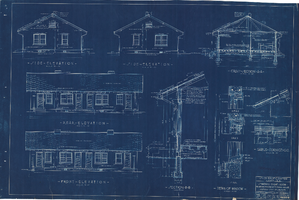
Los Angeles & Salt Lake Railroad standard eight room reinforced concrete bunk house: architectural drawing
Date
Archival Collection
Description
From Union Pacific Railroad Collection (MS-00397). The drawing shows elevations and sections of the bunk house. The bottom corner says, "Union Pacific System, L.A. & S.L.R.R. Standard Eight Room Reinforced Concrete Bunk House, Locations East Of Caliente. Ass't. Chief Engineers Office, Los Angeles. Drawn By F.W.G. Traced By F.W.G. Checked By W.V.L-B. Date June 1926. Scales As Noted. Revised Jan. 1927. April 1929. Drawing. No. 15634-B-."
Image
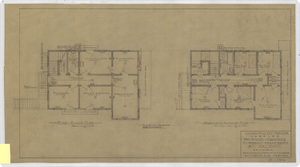
Proposed changes to present Los Angeles & Salt Lake Railroad frame depot, Caliente, Nevada: architectural drawing
Date
Archival Collection
Description
From Union Pacific Railroad Collection (MS-00397). The drawing shows the First and Second Floor Plans. The bottom corner says, "Union Pacific System L.A. & S.L.R.R. Proposed Changes To Present Frame Depot At Caliente, Nevada. Asst. Chief Engineer's Office, Los Angeles. Scale 1/4" = 1'0." E.C.B. Oct 30 1922. S118-A."
Image
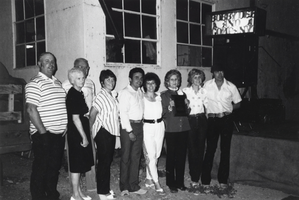
Family at a gathering in recognition of Rene Zaval's 25 years of service at Carver's Station: photographic print
Date
Archival Collection
Description
From the Nye County, Nevada Photograph Collection (PH-00221) -- Series V. Smoky Valley, Nevada and Round Mountain, Nevada -- Subseries V.C. Lofthouse-Berg Families (Round Mountain). Left to right: Gary Carver, Jean Carver Duhme; behind Jean Carver Duhme is her husband R.M. Duhme, Bertie Carver, Roger Berg, Ann Berg, Irene “Rene” Rogers Berg Zaval, Bobby Berg, Kenny Berg, at a gathering in recognition of Rene Zaval’s 25 years of service at Carver’s Station.
Image

Architectural drawing of the New Frontier Hotel and Casino (Las Vegas), building section thru Post Time Lounge, March 24, 1967
Date
Archival Collection
Description
Sections and reflected ceiling plans for the Post Time Lounge at the New Frontier Hotel and Casino from 1967. Includes revision dates. Original medium: pencil on parchment. Socoloske, Zelner and Associates, structural engineers; Ira Tepper and Associates, mechanical engineers; J. L. Cusick and Associates, electrical engineers.
Site Name: Frontier
Address: 3120 Las Vegas Boulevard South
Image
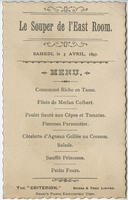
men000016s001_The Criterion, menu
Date
Archival Collection
Description
Text
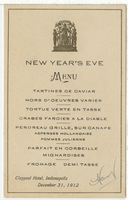
Claypool Hotel, New Year's Eve dinner menu, 1912
Date
Archival Collection
Description
Text
Esther Langston oral history interview
Identifier
Abstract
Oral history interview with Esther Langston conducted by Claytee D. White on February 22, 2005 for the UNLV @ 50 Oral History Project. In this interview, Langston provides an overview of her early life and career in social work. She describes how the women in her family are positive and empowering role models. Langston moves on to explain how she become a social worker over a period of many years. She states that a job experience that helped her gain the qualifications of a social worker was working as an office manager at the Nevada Test Site. She also mentions how she has had to work with conflicts such as racial inequalities.
Archival Collection
University of Nevada, Las Vegas Office of Media Relations Records
Identifier
Abstract
The University of Nevada, Las Vegas (UNLV) Office of Media Relations Records (1969-2003) primarily contain copies of UNLV faculty, staff, and alumni newsletters including
Archival Collection
